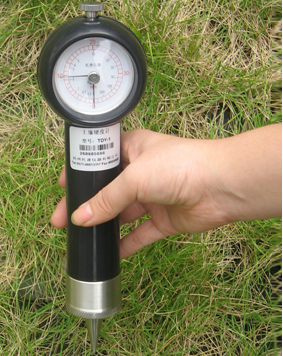Soil fertility is a very important indicator for assessing land productivity. Land with good soil fertility is generally not only loose in structure, but also balanced in nutrients and high in content. The soil with low soil fertility tends to be hard and hard, and it is easy to form a block and has poor ventilation and water permeability. It can be seen that the hardness of the soil has an impact on soil fertility, but the impact is large, we can use the soil hardness tester for analysis and exploration. The soil hardness tester is an instrument dedicated to soil hardness testing. It uses the theoretical value Kg/Cm2 of the pressure gauge to directly measure the hardness value of the soil. It is used to investigate the soil water permeability, air permeability and soil properties of large-scale machine operations. This soil hardness tester is very convenient and accurate. The soil hardness is high, which is caused by the decrease of soil fertility and the soil fertility is further reduced due to the increase of soil hardness. This is mainly because the soil with high hardness often affects the infiltration of water and the extension of plant roots, while the plants do not have strong roots, so the absorption of soil nutrients is insufficient, resulting in soil nutrient excess and soil compaction. The emergence of such a vicious circle, soil fertility is naturally lower and lower. Since soil hardness has such a large impact on soil fertility, in actual production, to improve soil fertility, soil hardness testing should be done first, and scientific and effective measures should be taken to improve soil quality based on the test results, such as increasing organic fertilizer. The amount of fertilizer applied; reduce the amount of fertilizer applied; further promote dry farming; promote straw returning, no-tillage, etc., the soil environment is improved, and soil fertility improvement will be more obvious. Soil health is the foundation of agricultural development. Focusing on soil health, we need to start from strengthening soil testing. With the help of professional soil testing instruments such as soil hardness tester, modern people have more clear soil quality, more productive labor, and more productive benefits. The more remarkable. Inorganic salts are compounds made up of metallic and nonmetallic elements, and they are generally one of the most common components of inorganic materials. Inorganic salts can be formed chemically or naturally. They play important roles in biological systems, such as maintaining osmotic pressure inside and outside cells, maintaining acid-base balance in organisms, and participating in metabolic processes. Common inorganic salts include chloride, sulfate, carbonate, phosphate and so on. Inorganic salts are also widely used in industrial production, such as in the manufacture of fertilizer, glass, ceramics, chemicals and so on. Inorganic Salts,Inorganic Chloride,Inorganic Ammonium Salts,Inorganic Salts Examples Wuxi Volksky New Materials Co.,Ltd. , https://www.volkskychem.com